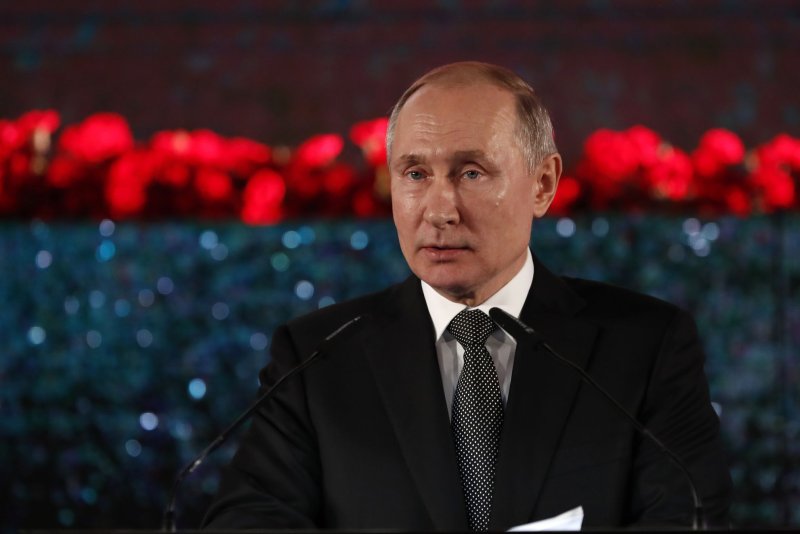To attempt to influence Russia’s foreign policy, and lacking better alternatives, the United States has opted to target ultra-rich businessmen and politicians that it perceives to be close to President Vladimir Putin. File Pool Photo by Emmanuel Dunand/UPI |
License Photo
March 6 (UPI) -- One of the most difficult questions for the United States and its democratic allies has been how to tackle criminal malign activities by governments and businesses originating in unfriendly and corrupt regimes that leach into their own domestic economies.
As a senior retired U.S. military police officer who conducted investigations on four continents, I am particularly aware of the insidious influence of international white-collar crime.
Understandably, Russia has dominated this discourse in Washington, D.C., following meddling in the 2016 U.S. elections and the 2014 invasion of Ukraine and annexation of Crimea. The country's opacity, oligarchs' merger with the Kremlin's political power and weaponization of business have made it difficult to know who and how to punish for rogue state activity.
To attempt to influence Russia's foreign policy, and lacking better alternatives, the United States has opted to target ultra-rich businessmen and politicians that it perceives to be close to the Kremlin.
Russian aluminium magnate Oleg Deripaska is arguably the most high-profile of those targeted. The oligarch, worth over $4.5 billion, is well known in the West for questionable relationships with the convicted Trump campaign manager Paul Manafort and the onetime influential British politician Peter Mandelson.
The sanctions initially were extended not only to himself but also to his publicly listed companies RUSAL and En+. After Deripaska agreed to sell some of his shares in these two companies, resulting in losing his control, sanctions against them were lifted last year. Leading congressional Democrats moved unsuccessfully to block the "sordid deal," reflecting their party's increasing discontent about Russian meddling through U.S. politics.
A recently released letter from U.S. Treasury Office of Foreign Asset Control to the oligarch's lawyers cited Deripaska's role in laundering money for Russian President Vladimir Putin as fundamental in its decision. In the past, the OFAC has alleged the oligarch has links to organized crime and the murder of another Russian businessman. Deripaska has described the claims as "balderdash," and OFAC's sanctions policy as "flawed and disingenuous."
Yet despite his personal prominence and alleged corrupt dealings with Putin, which the oligarch vehemently denies, Deripaska may be not alone on OFAC's target list when it comes to Russian money siphoning to U.S. soil. A number of prominent individuals now calling the USA their home hide in plain sight from charges of embezzlement and money laundering in their home countries.
Sergei Makhlai, the Russian businessman involved in fertilizer industry, is perhaps the most glaring example. Over a few years, along with his father, Vladimir Makhlai, who resides in London, he has managed to embezzle $1.5 billion from TOAZ, the biggest Russian producer of ammonia fertilizer, a company they controlled, Russian courts ruled.
Courts found that the fraud was centered on a series of kickback and asset-stripping schemes as the pair diverted funds and assets from TOAZ to affiliated Swiss and offshore entities with a network of co-conspirators at the expense of the company they had once privatized -- and its minority shareholders.
Ammonia produced at TOAZ was sold to a Swiss entity substantially below market prices to be resold on the open market generating margins of up to 30 percent. Operating assets were transferred to entities personally owned by the Makhlais through a chain of intermediaries. The father and son team deny culpability.
As a result, the company's main plant is in such a state of disrepair that environmental NGOs are predicting a chemical and environmental disaster with a devastating impact on the town of Togliatti (population 700,000), while the local industry regulator backed by courts has ordered immediate suspension of production until the facility is repaired and no longer poses a threat.
Having left Russia for good, following a nine-year jail sentence in absentia for large-scale fraud, Makhlai is building a new life in the United States as an American citizen under the name of George Mack.
However, he is reportedly also investigated in Ukraine on suspicion of bribing a state official, Viktor Bondyk, former CEO of state-owned company, which manages the cross-country ammonia pipeline. He is also being investigated in Russia for attempted bribing of Supreme Court judges in a failed attempt to reverse recovery of underpaid tax.
The best policy to stem the tide of international corruption and organized crime is to use all tools in the policymakers' toolbox: intelligence, law enforcement, financial regulation and immigration/border controls. It appears that U.S. immigration authorities are finally starting to take seriously the abuse of U.S. residency by fugitives from international justice. In October, it was announced by Immigration and Customs Enforcement that it had apprehended the former vice president of Russia's Olympic committee, Akhmed Bilalov. The oil tycoon turned infrastructure contractor for the government was sacked by Putin in 2013 in the face of high-level corruption. He is wanted in Russia in relation to these charges, and it is likely that he will be deported.
OFAC's ongoing battles with oligarchs such as Deripaska are sure to hit the headlines. The public and the politicians in Washington are increasingly -- and justifiably -- intolerant of Russian corruption and abuse of the U.S. asylum privileges by tainted business people. To mitigate this scourge, government agencies should focus more on the task at hand -- pursuing foreign white-collar criminals hiding in the United States using all instruments at their disposal.
U.S. Army Ret. Col. Wes Martin has conducted military police investigations on four continents, including work in Berlin, Baghdad and Kabul, Afghanistan.















